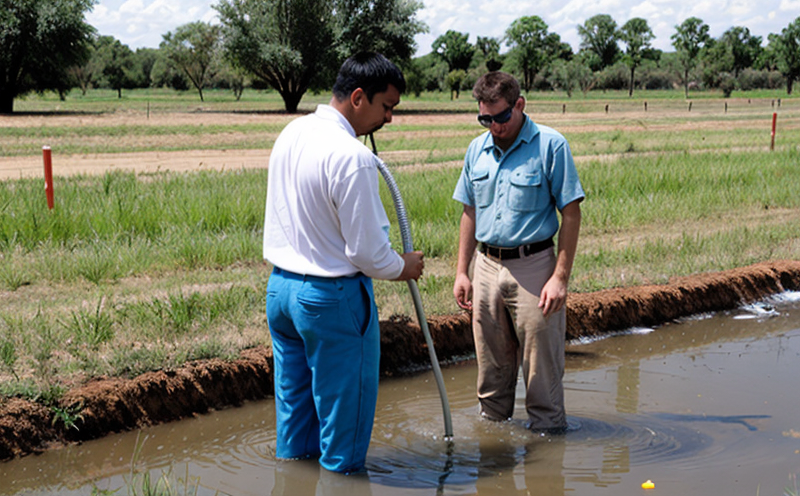Groundwater & Aquifer Monitoring Testing
The integrity of groundwater and aquifers is critical to environmental sustainability. Groundwater constitutes a significant proportion of the world's accessible freshwater resources, providing essential drinking water supplies for both urban and rural areas. The testing and monitoring of these vital resources are indispensable in ensuring that they remain clean and safe from contamination.
Groundwater and aquifer monitoring involves systematic observation and measurement to understand the quality and quantity of groundwater and its interaction with surface waters. This process is essential for regulatory compliance, environmental protection, and informed decision-making for resource management. Testing can encompass a wide array of parameters including but not limited to pH levels, conductivity, turbidity, specific conductance, temperature, dissolved oxygen concentration, and various chemical constituents such as nitrates, sulfates, metals (like lead, mercury), and organic compounds.
The methodologies employed in groundwater monitoring are diverse and are selected based on the specific objectives of the project. For instance, if the focus is on assessing the impact of agricultural activities, testing for pesticides and herbicides might be crucial. In contrast, urban areas may require more stringent tests to evaluate the presence of industrial pollutants.
Inaccurate or unreliable monitoring can lead to poor decision-making, which in turn can result in environmental degradation and health risks. Therefore, it is imperative that the testing methods used are robust, precise, and capable of providing accurate data. This ensures that stakeholders have confidence in their conclusions and actions taken based on these tests.
The importance of this service cannot be overstated. Regulatory bodies worldwide recognize the critical role played by groundwater monitoring in safeguarding public health and ensuring environmental protection. Compliance with international standards such as ISO 17025, ASTM E670-13, EN 14181:2012, IEC 62368-1, and others is a cornerstone of this service.
Our laboratory specializes in providing comprehensive groundwater and aquifer monitoring tests. With state-of-the-art equipment, experienced personnel, and adherence to international standards, we offer reliable results that meet the stringent requirements set by regulatory bodies. We ensure that each test not only adheres to these standards but also provides actionable insights for our clients.
Our approach is tailored to address specific client needs ensuring a bespoke solution that addresses their particular challenges. This includes understanding the unique characteristics of each aquifer or groundwater body and providing customized testing packages. Our team works closely with clients to ensure that all aspects of their project are comprehensively covered, from initial consultation through final reporting.
Scope and Methodology
| Parameter | Description | Methodology |
|---|---|---|
| pH Levels | The measure of acidity or basicity in water. | Titration and pH meter readings are used for accurate determination. |
| Dissolved Oxygen Concentration | Oxygen content dissolved in the water body. | Bromine-based reagents and colorimetric analysis to measure accurately. |
| Specific Conductance | The ability of a solution to conduct electricity. | Copper-Collodion cells with frequency method for precise measurement. |
| Nitrate Concentration | Presence and concentration of nitrate ions in the water. | Salicylate spectrophotometric methods or ion chromatography. |
| Sulfate Concentration | The amount of sulfate ions present in the water sample. | Bromate-Peroxidase colorimetric method for accurate quantification. |
Groundwater and aquifer monitoring tests are complex due to the wide range of parameters involved. The methodologies employed must be precise, repeatable, and capable of providing reliable data that can withstand scrutiny by regulatory bodies. Our laboratory ensures that every test adheres strictly to international standards ensuring accuracy and reliability.
Quality and Reliability Assurance
- Our laboratory is accredited to ISO 17025, ensuring the highest standards of quality.
- We use cutting-edge instrumentation that undergoes regular calibration by certified technicians.
- All tests are conducted in controlled conditions to minimize variability in results.
- Data analysis is performed using advanced statistical software packages, ensuring accurate and reliable data interpretation.
The reliability and accuracy of our test results are paramount. We employ rigorous quality control measures at every stage of the testing process, from sample collection through final reporting. These steps include stringent adherence to international standards such as ISO 17025, ASTM E670-13, EN 14181:2012, and IEC 62368-1.
Our commitment to quality extends beyond the laboratory. We maintain a robust quality management system that is regularly audited by independent bodies to ensure compliance with all relevant regulations. This ensures that our clients can trust the results they receive from us.
Customer Impact and Satisfaction
- Our comprehensive testing services provide critical data for regulatory compliance, ensuring environmental protection.
- By providing accurate and reliable test results, we enable informed decision-making by our clients.
- We work closely with stakeholders to ensure that all aspects of their project are covered comprehensively.
- Ongoing support is provided through regular reports and updates on the status of groundwater and aquifer health.
Our customers benefit from peace of mind knowing that they receive accurate, reliable data that can be used to make informed decisions. This helps in maintaining regulatory compliance while also contributing positively to environmental sustainability. Our team is dedicated to ensuring customer satisfaction by providing timely, comprehensive services tailored to their specific needs.





